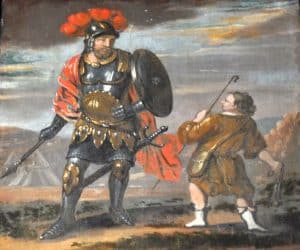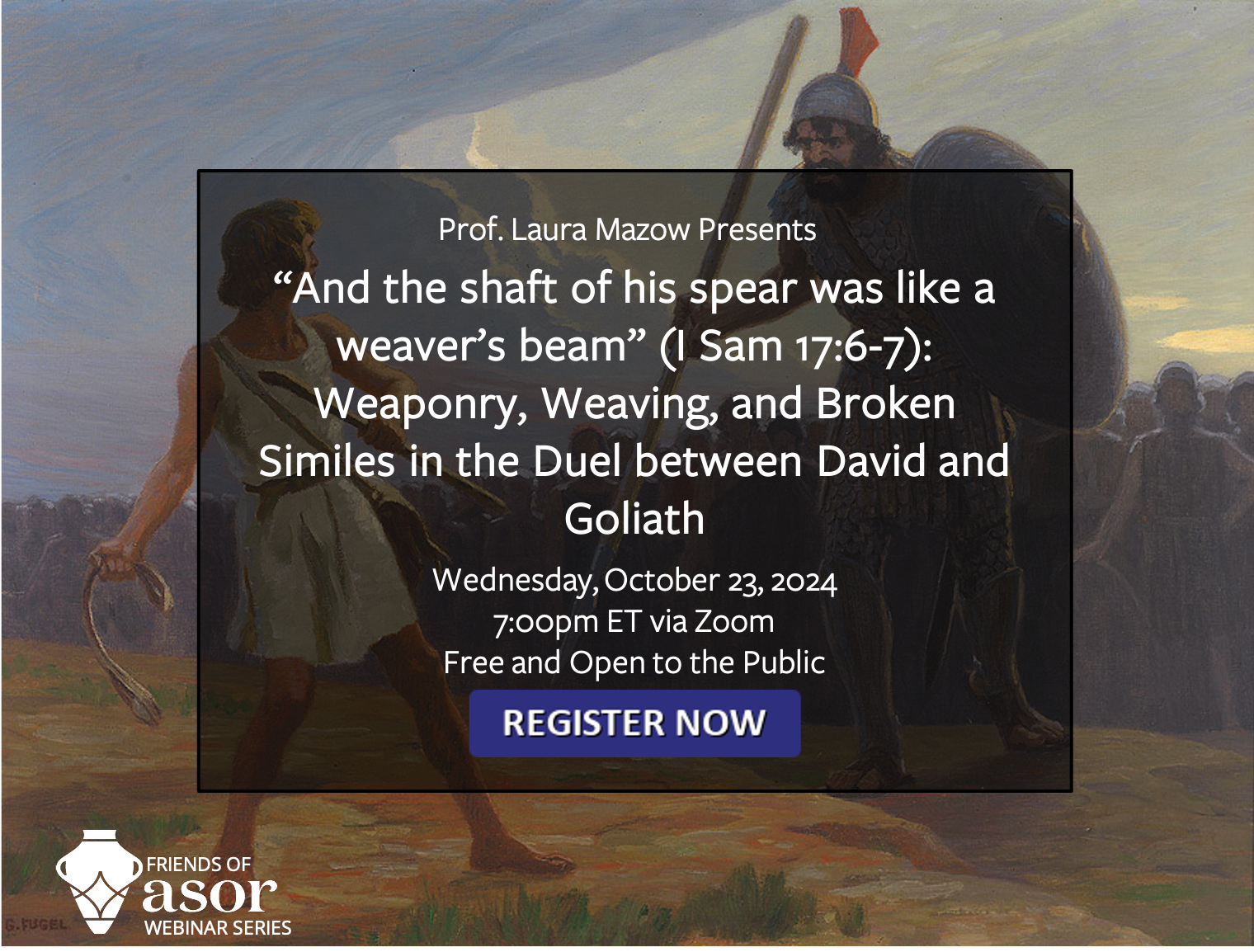
FRIENDS OF ASOR WEBINARS
“And the shaft of his spear was like a weaver’s beam” (I Sam 17:6-7): Weaponry, Weaving, and Broken Similes in the Duel between David and Goliath
Friends of ASOR present the next webinar of the 2024-2025 season on October 23, 2024, at 7:00 pm EDT, presented by Prof. Laura Mazow. This webinar will be free and open to the public. Registration through Zoom (with a valid email address) is required. This webinar will be recorded and all registrants will be sent a recording link in the days following the webinar.

There are two questions that arise, however, when examining Goliath’s weaponry, especially within the context of the rest of the story. The first is, where is the sword in this description—the one that David will use to behead Goliath and which is later given to David by the priest Ahimelech that is “like no other” (I Sam 21: 9)? The second asks, what is a weaver’s beam and what is the meaning of the simile comparing it to a spear? Yadin’s suggestion that the simile referenced a thonged javelin is awkward and doesn’t provide an answer to the missing sword.

Reconstructing Goliath’s martial outfitting has raised issues about the historicity of the textual narrative and the veracity of its details that have been engaged in debates on Goliath’s ethnicity and the dating of this text. Rather than reading Goliath’s weaponry as either historically inaccurate or so eclectic that it is unrepresentative of time and place, this proposal contextualizes the narrative details within an historical framework and reveals the dynamism of the textual transmission process.
Laura Mazow is an Associate Professor and Undergraduate Program Director in the Department of Anthropology at East Carolina University. She received her BA in History from Georgetown University, and her MA and PhD in Near Eastern Studies from the University of Arizona with a dissertation based on data from the Iron Age Philistine site of Tel Miqne-Ekron.
Laura has excavated at sites in Israel and Jordan, including Beth-Shean, Ashkelon, Gilat, Khirbet Iskander, Megiddo and Tel Miqne-Ekron. Her professional research interests include the Bronze and Iron Ages in the Middle East, Eastern Mediterranean, and North Africa, with a particular focus on the study of ancient weaving and wool processing tools and technologies. Laura’s recent publications include: “Why all Tubs are not Bathtubs,” Biblical Archaeological Review, Spring 2023: 16–18 and (forthcoming), “Ill-weav’d ambition, how much art thou shrunk! Re-examining ‘At the Fullers’ UET 6/2, 414 (Old Babylonian) as a Dialogue Between Weaver and Fuller.” She leads an ongoing collaborative project to investigate the function of ancient “bathtubs.” Were they used for bathing, burial, or textile production?
SPONSOR A WEBINAR!
Several levels of support from $50-$1,000 are available. Proceeds go towards membership scholarships and towards increasing ASOR’s virtual resources. Each sponsorship is tax-deductible and includes benefits! Sponsor a webinar here.
WHY SPONSOR ONLY ONE?
Season Sponsorships are also available from the ASOR Online Store here!
American Society of Overseas Research
The James F. Strange Center
209 Commerce Street
Alexandria, VA 22314
E-mail: info@asor.org
© 2023 ASOR
All rights reserved.
Images licensed under a Creative Commons Attribution-NonCommercial-ShareAlike 4.0 International License
COVID-19 Update: Please consider making payments or gifts on our secure Online Portal. Please e-mail info@asor.org if you have questions or need help.

